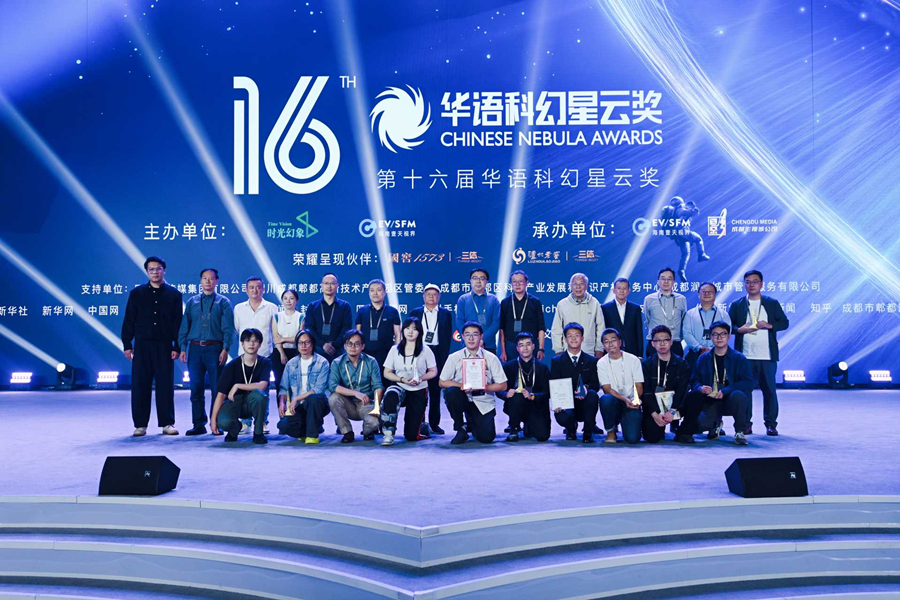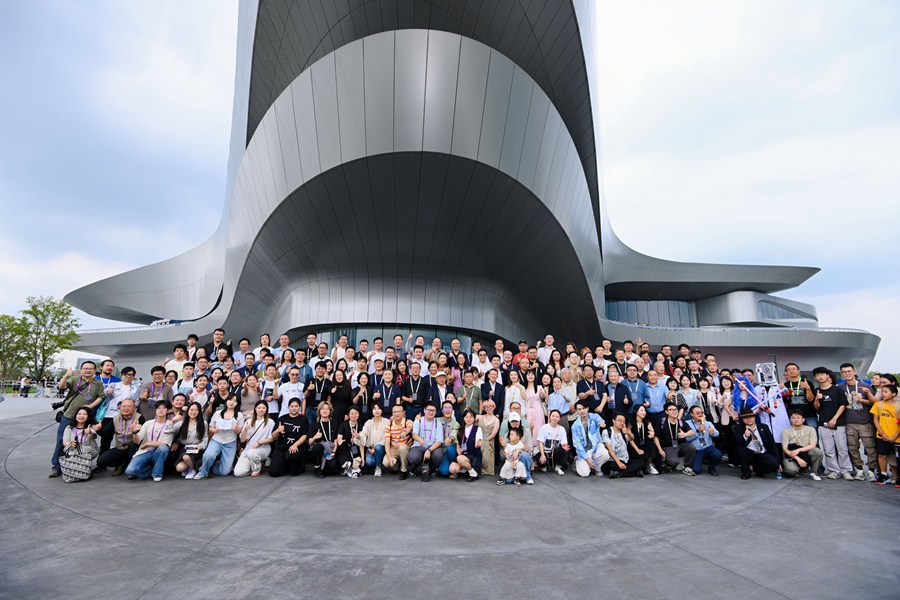Chinese science fiction writer Yang Wanqing won the top award for his novel "Golden Peaches" at the 16th Chinese Nebula Awards on Saturday in Chengdu, Sichuan province, adding to the Galaxy Award he received the previous day.

Chinese science fiction writer Yang Wanqing (center) receives the best novel award for "Golden Peaches" from presenters Dong Renwei (left) and Liu Cixin at the 16th Chinese Nebula Awards ceremony in Chengdu, southwest China's Sichuan province, Sept. 20, 2025. [Photo courtesy of EV/SFM]
"I feel surreal," Yang told China.org.cn. "I am grateful for the recognition from both the Chinese Nebula Awards and the Galaxy Awards. I will continue to strive forward and pursue my ideal creative realm!"
"Golden Peaches" is a novel set in the Tang dynasty (618-907) that follows three characters seeking a super algorithm inspired by ancient Chinese mathematics. The story imagines a technological world built on silk-based computation and optical signal transmission, exploring cultural clashes and integration between Eastern and Western civilizations.
"Yang Wanqing masterfully blends intricate technological settings, tumultuous power struggles, and the destinies of his characters," said Liu Cixin, the award presenter and author of "The Three-Body Problem," reading from the jury's citation.
"We follow the protagonists' footsteps through the weight of history and the marvels of technology, while also embracing a compassionate outlook toward humanity's future and touching upon greater possibilities for both China and the world through science fiction," Liu noted.
Other award winners included Pan Haitian's "Ah, Mars" for best novella; Zhang Ran's "Still Water" for best short story; Wang Dingding for translating Nathaniel Isaacson's "Celestial Empire: The Emergence of Chinese Science Fiction"; Xiao Han's study of Chinese sci-fi from 1949-1966 for best non-fiction; and Tanji Chuliqi for best new writer.

Award winners and organizers pose for a group photo at the 16th Chinese Nebula Awards ceremony in Chengdu, southwest China's Sichuan province, Sept. 20, 2025. [Photo courtesy of EV/SFM]
The awards also recognized multimedia categories. Jiang Feng, Luo Zimeng and Zheng Chen won the 2D art award for "Old Man's War." Li Shuhang won the 3D model award for "Group Erosion Theorem," while Liang Zijian won best animated short film for "Temporal Abyss Chronicles."
This year's awards also introduced a gaming category. "CrossFire Mobile," developed by TiMi Studio Group of Tencent Games, won the sci-fi mobile game award for its distinctive setting and innovative design.
The Chinese Nebula Awards, established in 2010 in Chengdu, recognize Chinese-language sci-fi writers and works. The awards were founded by figures in Chinese sci-fi, including Dong Renwei, Wu Yan and Liu Cixin.

Participants gather for a group photo at the 16th Chinese Nebula Awards ceremony in Chengdu, southwest China's Sichuan province, Sept. 20, 2025. [Photo courtesy of EV/SFM]
According to organizers, the awards remain committed to discovering, recognizing, and rewarding outstanding Chinese-language sci-fi works and authors worldwide. Through their annual review of Chinese sci-fi creation, the awards aim to stimulate creative vitality and promote the development of the cultural industry.
The awards have honored nearly 500 writers, including Liu Cixin, Wang Jinkang, Han Song, He Xi, Chen Qiufan and Jiang Bo, and over 700 works, helping numerous Chinese-language sci-fi creators gain visibility across China and worldwide.


 Share:
Share: 




 京公网安备 11010802027341号
京公网安备 11010802027341号